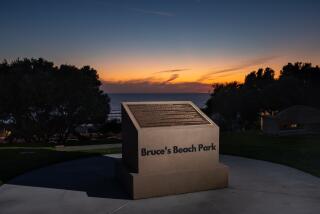Ah, camping: tents, s’mores -- and a Rodin sculpture?
- Share via
CROWN POINT, N.Y. — More than 10,000 campgrounds dot the American landscape. But only at the state-run campground in this remote Lake Champlain town can you find a Rodin sculpture on public display just steps from campers pitching tents and grilling burgers.
A bronze plaque created by Auguste Rodin a century ago will soon be returned to its place on the Champlain Memorial Lighthouse, slated to reopen this spring after a $2-million restoration project that included conserving the French sculptor’s “La France.”
The 25 1/4 -inch-by-21 1/2 -inch bas-relief bust depicting a woman -- reputed to be Rodin’s model and mistress, Camille Claudel -- was donated by the French government when the memorial was completed in 1912. It was removed from the 72-foot granite monument last year when crews began cleaning the memorial to French explorer Samuel de Champlain.
Crown Point, on a shoreline bluff 95 miles north of Albany, was home to a French settlement and fort from 1731 to 1759.
Though similar versions of the Rodin bust exist, it’s safe to say no other campground in the U.S. can lay claim to artwork created by a sculptor considered one of the greatest of the modern era, said Charles Vandrei, historic preservation officer for the state Department of Environmental Conservation, which operates the campground.
Rodin, who died in 1917, is best known for “The Thinker” and “The Kiss.”
The Rodin’s presence at Crown Point (population 2,000) wasn’t widely known outside this lakeside community, where locals consider it good luck to touch the sculptor’s signature -- “A Rodin” -- in the plaque’s lower left corner, Vandrei said.
Even within the art world, news of Crown Point’s Rodin can surprise some aficionados. The Rodin Museum in Paris wasn’t aware of it until a Vermont college professor’s inquiry several years ago, Vandrei said.
Officials at the Rodin Museum in Philadelphia were incredulous when told one of the sculptor’s works was displayed on a monument at a public campground in upstate New York.
“It’s one of those things that fell off everyone’s radar,” said Jennifer Thompson, an 18th and 19th century painting and sculpture expert at the Philadelphia Museum of Art, which administers the museum.
Although the rustic locale of the Rodin sculpture caught museum curators off guard, its presence on U.S. soil isn’t surprising, she said.
“Rodin was incredibly popular in America,” Thompson said. “Very early on, there were many American artists and American collectors who were going to France for Rodins.”
Francois Gauthier, France’s consulate general in Boston, said he learned three years ago that a Rodin was on public display at Crown Point. Gauthier helped raise the $3,000 cost of conserving the plaque.
“There are not many statues that are offered to the public like the statue at the Crown Point monument,” Gauthier said. “It’s a symbol of the French-American friendship.”
No special security measures had been in place to safeguard the Rodin bust, but that will change when the sculpture is remounted in its perch about 8 feet off the ground in the heavily patrolled campground. A surveillance camera and alarm system linked to an office staffed around the clock will be installed.
State agencies debated whether to return the Rodin to the monument or display it elsewhere in a more secure, less remote venue, Vandrei said. But because it was a gift from France to the American people, officials decided to keep it in Crown Point. A Champlain Memorial rededication ceremony is planned for Sept. 19.
More to Read
Sign up for The Wild
We’ll help you find the best places to hike, bike and run, as well as the perfect silent spots for meditation and yoga.
You may occasionally receive promotional content from the Los Angeles Times.






